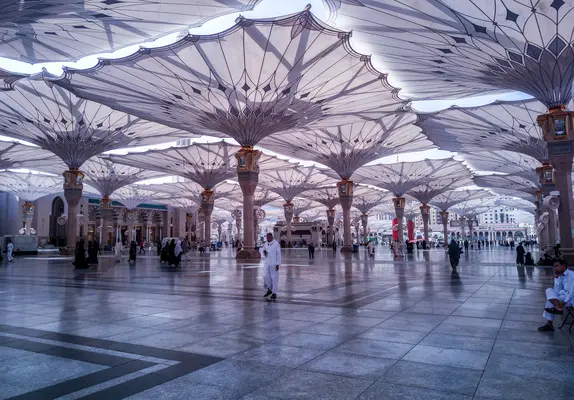
How to Perform Umrah for Women Crédit d'image :
Publié le 16 août 2023, par Samir | 12 h 48 min
Temps de lecture : 4 minutes
Umrah, a pilgrimage to the holy city of Mecca in Saudi Arabia, is a deeply revered and spiritually uplifting journey for Muslims worldwide. While the process of performing Umrah is similar for both men and women, certain considerations are specific to women due to the Islamic principles of modesty and respect. This article provides a comprehensive guide on how women can perform Umrah, honoring their faith and tradition. 1. Purify Your IntentionsBefore embarking on any spiritual journey, purifying your intentions is essential. Approach Umrah sincerely, seeking closeness to Allah and the purification of your soul. Make a firm commitment to uphold the principles of modesty and humility throughout the pilgrimage. 2. Observe the Dress CodeModesty is a cornerstone of Islamic teachings and crucial during Umrah. Women should dress modestly, covering their entire bodies except for the face and hands. A loose-fitting, non-transparent abaya or cloak is commonly worn, paired with a headscarf that covers the hair. 3. Perform Ritual Purification (Wudu)Just like men, women must perform wudu (ritual purification) before entering the Masjid al-Haram, the sacred mosque in Mecca. This involves washing the face, hands, and feet and wiping the head and ears. 4. Entering the Masjid al-HaramWhen entering the mosque, step in with your right foot and recite a supplication asking for Allah’s blessings and guidance. Women should walk respectfully, avoiding overcrowded areas and maintaining a calm demeanor. 5. Circumambulation (Tawaf)Tawaf circumambulates the Kaaba seven times in a counter-clockwise direction. Women should perform Tawaf on the outer part of the crowd, closer to the walls, to ensure a comfortable and modest space. Maintain a respectful distance from men during Tawaf. 6. Sa’i Between Safa and Marwah:After Tawaf, women proceed to perform Sa’i, walking seven times between the hills of Safa and Marwah. Again, women should choose a path where they can maintain modesty and comfort, avoiding overcrowded areas. 7. Cutting or Trimming Hair (Tahallul)After completing Sa’i, women can either cut a small portion of their hair or trim its ends. This symbolic act signifies the completion of the pilgrimage rituals. 8. Observing Etiquette and ConductWhile performing Umrah, maintain respect, humility, and patience. Avoid engaging in idle talk, remain focused on your worship, and avoid overcrowding or rushing during rituals. 9. Duas and SupplicationsThroughout the pilgrimage, engage in heartfelt prayers and supplications, seeking Allah’s blessings, forgiveness, and guidance. Supplication is a powerful means of connecting with Allah and seeking His mercy. 10. Optional Acts of WorshipBesides the obligatory rituals, women can engage in optional acts of worship such as praying extra prayers (Tahajjud) at night, making extra supplications, and seeking knowledge from scholars in Mecca. 11. Respectful InteractionWomen must interact with fellow pilgrims and residents respectfully and modestly while performing Umrah. Avoid prolonged eye contact with unrelated men and maintain a demeanor of dignity and humility. This embodies the spirit of Islamic etiquette and reinforces the values of the pilgrimage. 12. Seclusion During MenstruationMenstruating women are exempt from performing the Tawaf and Sa’i. They can still enter the mosque and engage in supplications, but they should abstain from physical acts of worship. Once their menstruation ends and they perform ritual purification (ghusl), they can resume their Umrah rituals. 13. Emotional and Spiritual ConnectionUmrah is not merely a set of rituals; it’s a journey of the heart and soul. Women should approach Umrah with a deep emotional and spiritual connection, allowing themselves to be enveloped by the profound sense of devotion that Mecca holds. Reflect on the significance of each step and use this opportunity to draw closer to Allah. 14. Health and Well-beingPrioritize your health and well-being during the journey. Women should ensure they are adequately hydrated, wear comfortable footwear for the walking portions of the pilgrimage, and adhere to any medical needs. Health and safety are vital components of worship, and taking care of your physical self is an act of worship. 15. Embrace the Journey’s ChallengesLike any significant journey, Umrah may come with challenges such as crowds, fatigue, and unfamiliar surroundings. Embrace these challenges with patience and gratitude. Remember that these tests can serve as personal growth and spiritual resilience opportunities. 16. Record Your ExperienceKeeping a journal or diary to document your Umrah journey can be a meaningful practice. Jot down your thoughts, reflections, and emotions as you move through each ritual. This serves as a personal record and allows you to revisit the spiritual insights you gained during this sacred journey. 17. Post-Umrah ReflectionAfter returning from Umrah, reflect on the experience. How has the journey impacted your spirituality, your perspective on life, and your relationship with Allah? Share your insights with fellow believers and integrate the lessons learned into your daily life.
Conclusion: A Journey of TransformationPerforming Umrah is a transformative experience for women, offering an opportunity to strengthen their faith, seek forgiveness, and grow spiritually. By adhering to the principles of modesty, respect, and devotion, women can embark on this sacred journey with a heart full of reverence and a soul eager to connect with Allah. Through each ritual and reflection, Umrah becomes a pivotal chapter in the spiritual journey of a Muslim woman, one that resonates with devotion, humility, and the unwavering pursuit of Allah’s mercy. |
lun. 20 Shawwal
الاثنين 20 شوّال |
| Contact | Mentions légales | A propos | Ressources | Blog | Glossaire | Questions réponses sur l'islam |
| Devenir musulman - Islam et terrorisme - Se convertir à l'islam - Prénom musulman - Roqya |
| English : al hamdulillah | Arabic : الحمد الله al-hamdoulillah.com © 2024 |